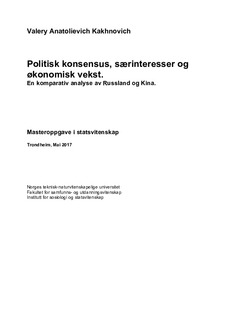| dc.contributor.advisor | Moe, Espen | |
| dc.contributor.author | Kakhnovich, Valery Anatolievich | |
| dc.date.accessioned | 2018-11-05T12:48:34Z | |
| dc.date.available | 2018-11-05T12:48:34Z | |
| dc.date.issued | 2017 | |
| dc.identifier.uri | http://hdl.handle.net/11250/2570990 | |
| dc.description.abstract | This thesis seeks to explain different levels of economic development. I compare the experiences of Russia and China during the transformation period - which began in 1991 in Russia and in 1979 in China. In seeking the answer to why China has been able to rise economically and to maintain a high level of economic development for a long period, while Russia has not, I chose to delimit the period of researh by the year 2013. The theoretical framework takes Espen Moe, Joel Mokyr and Daron Acemoglu and James Robinson as bases for theoretical propositions which I think get broad empirical support. First, it is essential that the state prevents vested interests from blocking institutional (structural) change. Second, when the state has been good at curbing vested interests it is because this state was characterized by political consensus about economic growth. When China moved ahead and stayed there, it was because political consensus about development prevented vested interests from blocking institutional (structural) change and in this way facilitated long-term economic growth and development. | nb_NO |
| dc.language.iso | nob | nb_NO |
| dc.publisher | NTNU | nb_NO |
| dc.title | Politisk konsensus, særinteresser og økonomisk vekst - En komparativ analyse av Russland og Kina | nb_NO |
| dc.type | Master thesis | nb_NO |
| dc.subject.nsi | VDP::Samfunnsvitenskap: 200 | nb_NO |
| dc.subject.nsi | VDP::Samfunnsvitenskap: 200::Statsvitenskap og organisasjonsteori: 240 | nb_NO |
